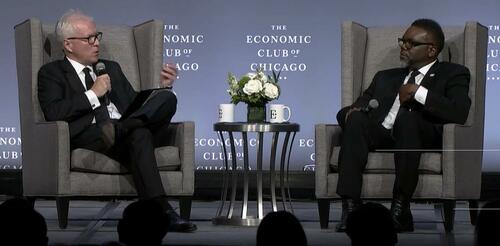
Authored by Mark Glennon via Wirepoints.org,
“As a former educator and longtime employee of the Chicago teachers union, what grade would you give the current system and why?”
That question was put to Chicago Mayor Brandon Johnson during his appearance Thursday night at the Economic Club of Chicago.
Mayor Johnson at the Economic Club of Chicago
His answer:
“I personally don’t give a lot of attention to grades…. My responsibility is not merely to just grade the system but to fund the system.
That’s how I am ultimately going to grade whether our public school system is working - based upon the investments we make to the people who rely on it.”
He offered nothing further about how to grade the schools or educational outcomes.
That answer was not an offhand comment taken out of context. It was a thoughtful answer that he explained. See for yourself. The question and answer start at the 47.3 mark in the video of his appearance.
After saying, “I personally don’t give a lot of attention to grades,” he went on to explain that, instead, “we have to establish a rubric that speaks to the needs as well as the unique dynamics that exist.” He described some of the special challenges Chicago schools face, and said “but, unfortunately, we have had this standardization of our schools that has sucked out our imagination.”
He asked how we can “grade a system when the system has not fulfilled its basic obligation of providing an equitable system that speaks to the needs?”
“And so,” he concluded, “the very concept and ideal of public accommodation is deeply tethered to the experience and desire for black liberation. My responsibility is not merely to just grade the system but to fund the system. That’s how I am ultimately going to grade whether our public school system is working — based upon the investments we make to the people who rely on it.”
There were only two other highlights in Johnson’s appearance. First was his answer to a broad, overriding question toward the end (at the 55.0 mark) about how to get past the division in the city and get to the “collaboration to get stuff done.”
“I’ve said this before,” Johnson answered.
“There are forces that did not accept the results of the Civil War. And there are real forces that want a rematch. Don’t give in to them. Don’t give it them.”
He went on to talk about the importance of love and cooperation.
Really? The first thing that comes to his mind are people who want to refight a war to preserve slavery? He’s the fourth black mayor in a city that sent the first black man to the White House.
Second, at the 43.30 mark Johnson talked about addressing the root causes of crime.
“President Johnson, fifty-plus years ago, said get at the root causes,” the mayor said, and he contrasted that with a racist comment at the time by Gov. George Wallace.
Then he said, “Had we actually addressed the causes of violence fifty years ago we would already be a better stronger safer Chicago. This generation cannot get wrong what the previous generation did.”
Hold on there. America rejected George Wallace, elected Lyndon Johnson and proceeded to spend some $14 trillion on Pres. Johnson’s Great Society programs — exactly the kinds of programs Mayor Johnson wants now to address root causes. It’s the apparent failure of those programs that many today worry about repeating.
The rest of Johnson’s Economic Club appearance was a waste of time. His address was comprised almost entirely of his standard, vague platitudes, though delivered in his customarily pleasant manner. The Q&A was more of the same.
Authored by Mark Glennon via Wirepoints.org,
“As a former educator and longtime employee of the Chicago teachers union, what grade would you give the current system and why?”
That question was put to Chicago Mayor Brandon Johnson during his appearance Thursday night at the Economic Club of Chicago.
Mayor Johnson at the Economic Club of Chicago
His answer:
“I personally don’t give a lot of attention to grades…. My responsibility is not merely to just grade the system but to fund the system.
That’s how I am ultimately going to grade whether our public school system is working – based upon the investments we make to the people who rely on it.”
He offered nothing further about how to grade the schools or educational outcomes.
That answer was not an offhand comment taken out of context. It was a thoughtful answer that he explained. See for yourself. The question and answer start at the 47.3 mark in the video of his appearance.
[embedded content]
After saying, “I personally don’t give a lot of attention to grades,” he went on to explain that, instead, “we have to establish a rubric that speaks to the needs as well as the unique dynamics that exist.” He described some of the special challenges Chicago schools face, and said “but, unfortunately, we have had this standardization of our schools that has sucked out our imagination.”
He asked how we can “grade a system when the system has not fulfilled its basic obligation of providing an equitable system that speaks to the needs?”
“And so,” he concluded, “the very concept and ideal of public accommodation is deeply tethered to the experience and desire for black liberation. My responsibility is not merely to just grade the system but to fund the system. That’s how I am ultimately going to grade whether our public school system is working — based upon the investments we make to the people who rely on it.”
There were only two other highlights in Johnson’s appearance. First was his answer to a broad, overriding question toward the end (at the 55.0 mark) about how to get past the division in the city and get to the “collaboration to get stuff done.”
“I’ve said this before,” Johnson answered.
“There are forces that did not accept the results of the Civil War. And there are real forces that want a rematch. Don’t give in to them. Don’t give it them.”
He went on to talk about the importance of love and cooperation.
Really? The first thing that comes to his mind are people who want to refight a war to preserve slavery? He’s the fourth black mayor in a city that sent the first black man to the White House.
Second, at the 43.30 mark Johnson talked about addressing the root causes of crime.
“President Johnson, fifty-plus years ago, said get at the root causes,” the mayor said, and he contrasted that with a racist comment at the time by Gov. George Wallace.
Then he said, “Had we actually addressed the causes of violence fifty years ago we would already be a better stronger safer Chicago. This generation cannot get wrong what the previous generation did.”
Hold on there. America rejected George Wallace, elected Lyndon Johnson and proceeded to spend some $14 trillion on Pres. Johnson’s Great Society programs — exactly the kinds of programs Mayor Johnson wants now to address root causes. It’s the apparent failure of those programs that many today worry about repeating.
The rest of Johnson’s Economic Club appearance was a waste of time. His address was comprised almost entirely of his standard, vague platitudes, though delivered in his customarily pleasant manner. The Q&A was more of the same.
Loading…





